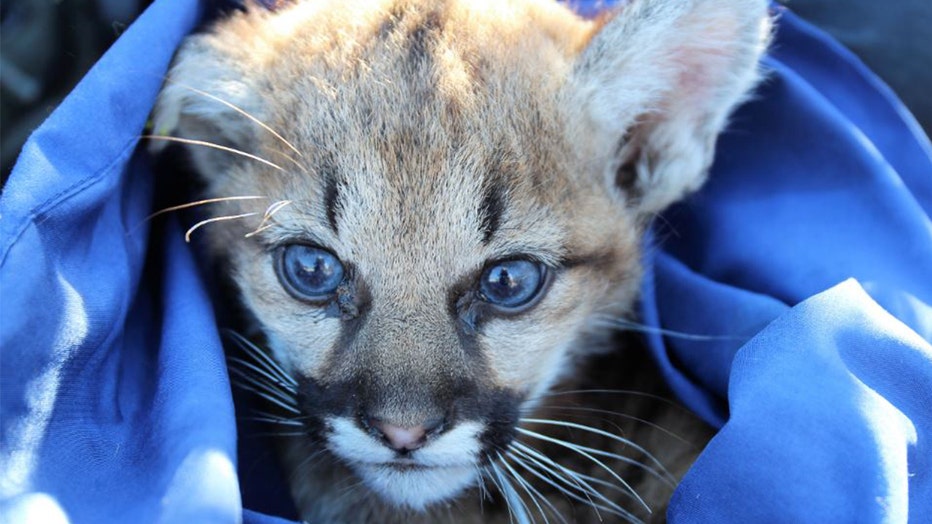Mountain lion kittens that died in Thousand Oaks test positive for rat poison
THOUSAND OAKS, Calif. - Two mountain lion kittens that died just days after being discovered last November in a Thousand Oaks office complex tested positive for rat poison, National Park Service (NPS) officials reported Wednesday.
The kittens were part of an orphaned litter of four. At the time of capture, the kittens appeared to be about six weeks old.
Officials performed a necropsy of the two deceased kittens, P-100 and P-102, and found that they both had residues of three different types of anticoagulant rodenticide (AR) compounds - brodifacoum, bromadiolone, and diphacinone - in their livers.

P-102, a six-week old mountain lion kitten who died, was found with three different types of anticoagulant rodenticide (AR) compounds in her liver. (Credit: National Park Service) (FOX 11)
The postmortem examination found both kittens to be emaciated, with a heavy flea infestation. Microscopic examination of their tissues revealed inflammation in their brain as well, and the detection of feline parvovirus in numerous tissues.
Feline parvovirus is a highly contagious virus that can cause illness, called feline panleukopenia, and death, particularly in young kittens, the NPS said in a press release. The necropsy report noted signs of the disease that were seen before the kittens died, including seizures, and indicated panleukopenia as contributing to the cause of death.
SUGGESTED: Mountain lion P-22 caught on camera outside Hollywood Hills home
"This is the first time a mountain lion in the park's 20-year study has been affected by parvo, and these two kittens are the youngest mountain lions in the study to have anticoagulant rodenticides in their system," said Jeff Sikich, a biologist who has led the fieldwork for the mountain lion study for two decades. "Thirty-one of 32 mountain lions have tested positive for exposure to one or more AR's, and seven have died directly from poisoning."
At the time of capture in late November, NPS biologists and the California Department of Fish and Wildlife (CDFW) fitted the four kittens - P-100, P-101, P-102, and P-103 - with tracking collars and collected biological samples.
Get your top stories delivered daily! Sign up for FOX 11’s Fast 5 newsletter. And, get breaking news alerts in the FOX 11 News app. Download for iOS or Android.
Authorities did not know the identity of the kittens' mother, which was not being tracked by the NPS. At that young age, they would not be able to survive on their own, according to the NPS, so their best chance for surviving in the wild was if their mother continued to care for them.
The kittens were captured and collared in a natural open space adjacent to the office park where they were initially discovered, and biologists monitored them, hoping their mother would return.
When this didn't happen, CDFW, with help from the NPS, retrieved them from the park area, and CDFW took the kittens to a local veterinarian, where the two kittens died overnight.
P-101 and P-103 survived their ordeal and are now in captivity and cared for by the Orange County Zoo in Irvine.
Tune in to FOX 11 Los Angeles for the latest Southern California news.

